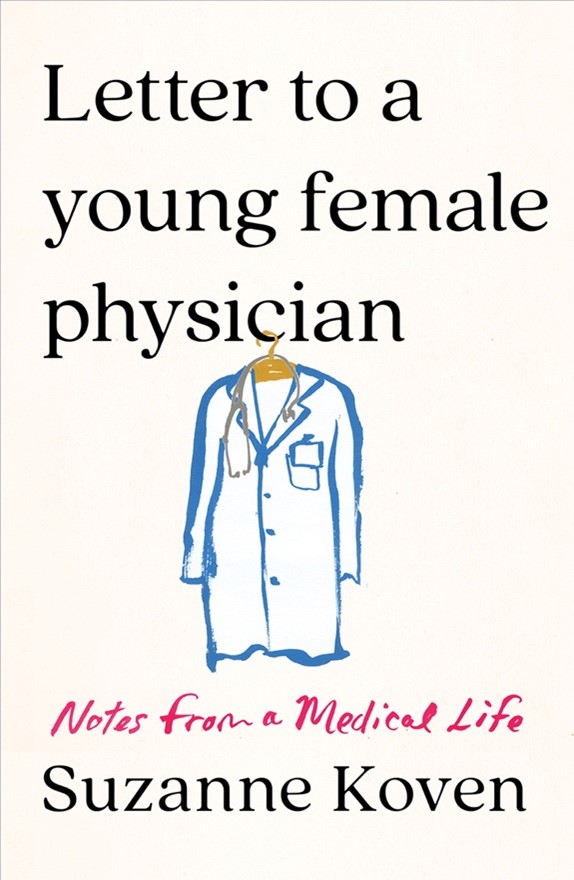
Letter to a Young Female Physician
Book written by Dr. Suzanne Koven
Review provided by Charlotte B. Smith
I first came across ‘Letter to a Young Female Physician’ in a review article. It was described as “Chicken Soup for doctors” in reference to the best-selling self-help series about finding inspiration in ordinary people’s lives [1]. As she weaves her narrative around ‘ordinary’ occurrences in her medical life (medical school, transition into residency and practice, and a few memorable patients), Dr. Suzanne Koven shares authentic and poignant reflections on what it means to be a humanin medicine.
Dr. Koven’s memoir took its initial shape as a letter in 2017 for the New England Journal of Medicine. [2] Looking over a room filled with new interns writing self-addressed letters, she did a spin-off the prompt and wrote to younger women about what she would have wished to have known in their shoes. The initial letter touches on discrimination and sexism in medicine, but most notably, Dr. Koven’s struggle with imposter syndrome: “I now understand that I should have spent less time worrying about being a fraud and more time appreciating about myself some of the things my patients appreciated most about me.”
Following the letter’s success, the book morphed into a collection of twenty-four essays. While not following a strict chronological order, each section centers around a moment in Dr. Koven’s career that brought clarity to the obstacles she faced as a physician. As a current second-year medical student, I loved reading “Mnemonics,” “We have a body,” and how the pieces fell into place as she recognized Kussmaul’s sign during the chaos of a complex case—perfectly capturing the blend of excitement and trepidation you feel as a student. I paused while reading “Lineage” as Dr. Koven recognized that she “never once paused to consider that [her] professional ancestry included no women.” In conversation with many of my female classmates today, I believe there is an intentional effort to seek female mentors. I know that some of my peers even finalized their medical school decision based on the representation of women in leadership roles at the institution. And thanks to initiatives such as the AWS Dorothy Brown & Maria Garcia Sancho Surgical Mentoring Program, it has become more accessible for women to be paired with accomplished female mentors in their field.
While I am happy to report on the progress in access to female mentorship, I believe that the “imposter phenomenon” is still thriving in medicine today. Before Pauline Clance and Suzanne Imes introduced the term in 1978, Dr. Koven and her close friend referred to themselves as “The Asterisks.” For example, “we got into Johns Hopkins* (*but there weren’t many applicants to medical school that year).” Having completed my secondary education in France, I remember my first conversation about imposter syndrome with a pre-med student as an undergraduate in the U.S. More recently, the word “imposter” seems to frequently work its way into conversations with medical school peers when reflecting on a challenging week or a difficult test. All of these exchanges have one thing in common: they were all with women. But, as Dr. Koven considers in her epilogue, is imposter syndrome an “American phenomenon” and “the inevitable downside of American upward mobility”? As I have become more accustomed to the term, my observation is that American students may just be faster to associate their insecurities with their gender than their international counterparts.
When asked how to “get over” imposter syndrome, Dr. Koven replies, “it helps to get old.” What I took away from her blunt yet humorous response is that, with experience, accomplished female physicians may be quicker to recognize that many of their insecurities are shared by other people, genders, and that impostership need not be suffered from alone and in private. In short, I believe this is the ultimate goal of Dr. Koven’s memoir:
“How I wish I could spare you years of self-flagellation and transport you directly to this state of humility. […] My dear young colleague, you are not a fraud. […] Your training and sense of purpose will serve you well. Your humanity will serve your patients even better.”
The lessons shared in “Disease of the little paper,” “Off the Charts,” and “Science and Kindness” have shaped the type of doctor I hope to become. Yet, Dr. Koven’s reflection on her relationship with her parents makes this book a must-read for all physicians and physicians-in-training. Parallel to her career arc, Dr. Koven paints the changing nature of her relationship with her aging parents and describes how her status as a doctor influenced her role as a daughter. Beautifully written, the author draws you into her mother-daughter relationship—I felt like I gained both Dr. Koven and her mother as mentors in those tender moments. While I have reflected on the difficulties of balancing motherhood and medicine, Dr. Koven’s forced me to think about the interesting position of being a daughter in medicine and how one’s parents can frame one’s life and career path in more ways than what initially meets the eye.
Although the memoir addresses female physicians, I would agree with the many positive reviews that Dr. Koven’s work is a ‘do not miss’ for all genders, specialties, and disciplines in the medical field. Chicken soup for doctors, and much, much more.
Works Cited
[1] L. Kolbe, "‘Letter to a Young Female Physician’ Review: Chicken Soup for Doctors," 1 June 2021. [Online]. Available: https://www.wsj.com/articles/letter-to-a-young-female-physician-review-chicken-soup-for-doctors-11622586119.
[2] S. Koven, "Letter to a Young Female Physician," N Engl J Med, Vols. 18;376(20):1907-1909., 2017. doi: 10.1056/NEJMp1702010
About the Author

Suzanne Koven completed her M.D. and residency at John Hopkins. She is currently a primary care physician at Massachusetts General Hospital (MGH) and a faculty member at Harvard Medical School. She is also the inaugural writer-in-residence at MGH, with recent work featured in the New England Journal of Medicine, the Lancet, and the New Yorker. Originally from New York City, she currently lives with her family near Boston. She can be found at http://suzannekoven.com.
About the Reviewer

Charlotte Smith is a second-year medical student at UNC School of Medicine, interested in Trauma and Critical Care Surgery. She grew up in France before attending UNC-Chapel Hill for her undergraduate studies. Her current research focuses on pediatric trauma and gender equity in medical education. In AWS, she has served as Co-President of the UNC Chapter and the 2021-2022 Southeast Regional Representative with the AWS National Medical Student Committee. She can be found on Twitter at @cblythesmith.

